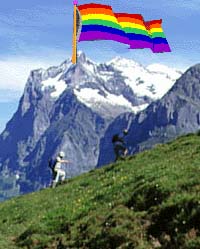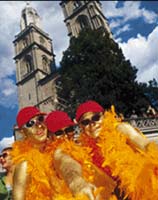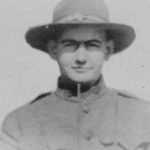(Updated April 2010)
A Long History
In 1883 my great grandfather and his not-yet wife packed their meager bags and left the Swiss farmland of their ancestors.  By foot, train and ship they arrived in New York harbor–before Ellis Island–along with thousands of other anxious immigrants wondering what next would be in their lives.
By foot, train and ship they arrived in New York harbor–before Ellis Island–along with thousands of other anxious immigrants wondering what next would be in their lives.
I think about them, now and then, in this 21st century. Why did they leave? What urgent desire or fear or fantasy drove them to such an extreme change in their rural lives? Surely they knew life would not be easier as foreigners in a strange land with no common language, no customary food, no familiar faces.
I thought about them in 1963 as I arrived by bicycle in Switzerland to find the town and fields they left behind a century before. There were cousins here; my great grandfather had a brother and three sisters who wrote to him until they died. With an old letter bearing a return address I found myself in a strange familiar land and, after some searching, finally talking to strangers who were my family.

As if time and distance were not enough to scatter family bonds, my being gay was yet another missing link in reconnecting with my roots. It was, at that time, also a missing link in my own self-identity as I felt attractions and stimulations but without a ‘country’ in which to locate them.
Nearly forty years later the cousins and I are still good friends and they have all met my ‘husband’. Some of them have come to stay with us on occasion and now their children are grown and making more Swiss citizens and more second or third cousins.
Modern Times
Not far away from my ancestral home town of Herzogenbuchsee is the big city Zurich, the gay capital of Switzerland where I sat recently at a gay café watching cosmopolitan and fashionably dressed people wander by. From high dungeon drag to haute couture, Zurich’s secular scene encompasses the extremes of modern Europe. Spiked orange hair, black combat boots, shredded jeans and a chain collar on one younger punker; a sleek St Laurent overcoat wrapped around a manicured and coifed elder dame topped with a tilt-brimmed yellow hat walking her spotless Pekenese mini-dog with its own collar–of rhinestones.
 Always in the avant-garde of Swiss thought and style, it’s not surprising that Zurich is far ahead of any other city in the country including its gay life, culture and scene. Talk about a time warp: my ancestors, a hundred immigrant years, a farm of cows and crops–and me, here by way of a huge sleek jet, sitting under a rainbow queer flag reading a list of homosexual activities and venues happening in downtown Zurich.
Always in the avant-garde of Swiss thought and style, it’s not surprising that Zurich is far ahead of any other city in the country including its gay life, culture and scene. Talk about a time warp: my ancestors, a hundred immigrant years, a farm of cows and crops–and me, here by way of a huge sleek jet, sitting under a rainbow queer flag reading a list of homosexual activities and venues happening in downtown Zurich.
This city does not have the population of Berlin or Paris or London so it doesn’t have the wide variety of gay offerings of those leading pride-filled cities, but it is one of Europe’s most vibrant gay communities and there is enough to satisfy a visitor or native in search of a full, spicey or quiet life here.
Among the medieval architecture and wealth of art and in the crisp, clean environment, there is a tolerant way of life and hopping nightlife. Some call it ‘downtown Switzerland’: vibrant, trendy, intelligent located among Switzerland’s stunning beauty. Zurich has, more than once, been voted one of the world’s most livable cities. Much of the city’s favorite gay bars can be found along the cobblestone streets of the Niederdorf, A varied club scene is scattered throughout the city’s outskirts–from hot dance clubs to cruise and leather spots.
 In June of each year, Zurich stages its own version of Christopher Street Day (as does Geneva in July). This year Zurich’s 4000-strong march used Sister Sledge’s song “We are family” as their parade theme. Waving the usual rainbow flags and decked out in flamboyant outfits, revelers and spectators hooted and cheered their way through the city center.
In June of each year, Zurich stages its own version of Christopher Street Day (as does Geneva in July). This year Zurich’s 4000-strong march used Sister Sledge’s song “We are family” as their parade theme. Waving the usual rainbow flags and decked out in flamboyant outfits, revelers and spectators hooted and cheered their way through the city center.
Aside from the usual and numerous bars, discos, saunas, clubs and organizations (see list of gay links, left column), there is a high degree of freedom of choice in Zurich (and Geneva, Basel, Berne) despite Switzerland’s generally conservative political and cultural demeanor. Surrounded by nations (Italy, Austria, Germany, France) that have gone through tumultuous political and economic upheaval over the past two hundred years, Switzerland’s secular democracy has been stable for over 700 years holding together twenty-some Swiss cantons speaking Italian, German, French and Romanisch in one confederation of states.
In September 2002 Swiss voters passed a referendum on homosexual partnerships which gave nearly full marital rights to LGB couples. The referendum put an end to a political/religious battle begun the year before when a gay partnership law was passed by Zurich authorities only to be challenged by religious conservatives.
 At first the new legislatioin was a real stretch for Switzerland which reveals a history that has been governmentally conservative, militarily non-confrontational, financially discreet, sexually inhibited, religiously restrained yet culturally tolerant and receptive to new (not radical) ideas. As a result, the country today is an odd blend of traditional and staid values while tolerating experimental lifestyles. It is chocolate, coo-koo clocks and white Alps. At the same time, it is Swatch watches, world-class engineering and lesbigay couples making unions.
At first the new legislatioin was a real stretch for Switzerland which reveals a history that has been governmentally conservative, militarily non-confrontational, financially discreet, sexually inhibited, religiously restrained yet culturally tolerant and receptive to new (not radical) ideas. As a result, the country today is an odd blend of traditional and staid values while tolerating experimental lifestyles. It is chocolate, coo-koo clocks and white Alps. At the same time, it is Swatch watches, world-class engineering and lesbigay couples making unions.
Living together as a queer couple creates no ripples (well, almost never). Being out at work, in most places, does not invite discrimination. Gays are welcome to serve in the military. Yet, coming out is often problematic, not because of any legal anti-gay statutes, but the culture has been traditionally Christian (protestant predominantly but with many Roman Catholics) and most families, as sober Swiss, like to keep things calm and quiet. Reactions vary from family to family. No one in my six extended Swiss families raised an eyebrow as they found out about me.
Fragile Forests and Feelings
Yet like the Alpine fragile forests and mountain spring waters, relationships can be disturbed.
Karl first saw Biju at Basel University where Karl was studying for an advanced degree in languages. Biju was taking courses in English and German as second languages. Tall and dark, Biju was born in Sarajevo, Bosnia of a Muslim family who had been driven out by the Serbian Orthodox military during its fanatic ethnic-cleansing holocaust in the early nineties. The family was smuggled into Switzerland by sympathetic friends and had been given refugee status until they could settle and apply for work permits.
 Now three years later, Biju worked as a scaffolding constructor during the day and as a waiter at a Lebanese restaurant in Basel where Karl and some friends came for dinner one night. Karl recognized Biju and the two struck up a friendship that evolved into a love affair. Being a Muslim (Karl was a “lapsed protestant”), Biju was not wholly comfortable with his own strong attraction to Karl as the two moved into their first year of bonding.
Now three years later, Biju worked as a scaffolding constructor during the day and as a waiter at a Lebanese restaurant in Basel where Karl and some friends came for dinner one night. Karl recognized Biju and the two struck up a friendship that evolved into a love affair. Being a Muslim (Karl was a “lapsed protestant”), Biju was not wholly comfortable with his own strong attraction to Karl as the two moved into their first year of bonding.
It was not until their second year that Biju felt safe enough to move in with Karl. Biju’s family had met Karl several times and liked him. With no explicit words, they came to realize that their son and Karl were more than friends. As long as there was a quiet veil and undeclared understanding, Biju’s family seemed tolerant and warm.
“Even though his family was accepting, I think Bijou still felt guilty,” said Karl one evening over dinner at the Golden Lion restaurant in central Zurich. “Guilty because he was gay, guilty because he enjoyed sex, guilty because he was not honestly out to his family. At first this didn’t bother him much. He would come over and stay for a day or two then go home. When we moved in together, it was great and we were like newlyweds setting up our nest and inviting friends to dinner. Things went well for over a year. My family welcomed him—which was a stretch for them since they were very traditional fair-haired, lederhosen Swiss types who did not know any Muslim people, let alone a gay Muslim boyfriend of their son’s,” he laughed.
“Then we went to Sarajevo,”, he sighed and took a deep breath.
“It was my idea. Biju had always wondered what had happened to his friends and relatives so I suggested we go for a visit. It wasn’t a good time. Some people were glad to see him and were happy he was well. But others thought his family had abandoned the mother land and Muslim values by staying in the ‘west’. This troubled him, and when we returned I could see he was bothered by the terrible destruction and tensions still there.
 “One particular hurt came from his former ‘boyfriend’. They had been best friends and as teenagers they had felt their first love for each other. But this guy, now older when we located him, was cold and brittle toward Biju. He had been injured and captured and sexually abused by the Serbs. I think seeing Biju brought back too many painful memories—ones that Biju had escaped and ones that he had suffered.
“One particular hurt came from his former ‘boyfriend’. They had been best friends and as teenagers they had felt their first love for each other. But this guy, now older when we located him, was cold and brittle toward Biju. He had been injured and captured and sexually abused by the Serbs. I think seeing Biju brought back too many painful memories—ones that Biju had escaped and ones that he had suffered.
There was an abyss between them. Biju was shocked by his first love’s torn-up appearance and obviously tormented soul. That night he cried in my arms, unconsolable, helpless and angry with himself for having left him behind.
“When we returned, Biju couldn’t get over it. He became moody and irritable toward me. About a month later, we had an argument and he lashed out and hit me. I saw there was now an abyss between us as well. A few days later he moved back home with his family and we have hardly spoken since,” Karl said with moist eyes.
“I saw his mother by accident a couple of months ago and she said Biju was OK. He was taking more classes and working.” I didn’t’ ask any further questions, but I felt she was really sorry that things had ended badly for us. She was very sweet and I couldn’t help giving her a hug as we parted.”
More Successful
Counter to this sad tale are the numerous LGB couples visible at gay and gay-friendly cafes and clubs in Zurich, including fifty-something Hilda and Gretta whom I mey accidentally at Rathaus Cafe. Together for 23 years, they dressed alike and had similar hair styles (short). Our meeting was casual and not extensive but they said they had experienced no homophobic discrimination in their years in Zurich “probably because the city is big and more liberal than the rest of the country”.
They had formalized their relationship as domestic partners: “Why not. We are more married than many straight people with their squabbles and divorces”, laughed Hilda. Asked if they knew other LGBT couples, “Oh, yes of course. Even some of our Parliament members have domestic partners now–things have changed so much since we were young! It’s a good thing–a right thing.”
Wondering as I Wander
A few days later I took a walk (there are countless marked paths here called ‘wanderwegs’) among the lower green slopes of the Alps, I could hear the bells of the grazing cattle and see the blue skies and wooden chalet-style farmhouses rooted to the land. This is the land of my making–the land of discontent for my great grandfather. I will never really know why he left such a beautiful place–as I see it as a 21st century gay tourist with more freedom and money than he ever had.
I will never really know why he left such a beautiful place–as I see it as a 21st century gay tourist with more freedom and money than he ever had.
However, I can understand how harsh it is to work the land and cows from sun-up to sun-down; one of my cousins today is a farmer and both she and her husband look old beyond their years.
I still feel touched by the story of Karl and Biju, a loving couple broken by cultural differences, terrible memories and conflicted feelings. I am reminded, as I have been so many times in the past, that loving sexuality is ultimately a luxury, a precious benefit of other ‘settled conditions’ in our lives—peace in our land, gracious approval of others, a certain serenity of soul, a supportive justice system, useful work, fond memories of past love, and a deep secure feeling that being emotionally and physically attracted to our own gender is a profoundly beautiful thing–like Hilda and Gretta.
Also see:
Gay Switzerland News & Reports 2000 to present
Gay Switzerland Photo Galleries
















